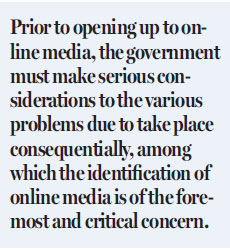Concerns about opening gates to online media
Updated: 2017-09-20 05:46
(HK Edition)
|
|||||||||
Editor's note: The Information Services Department has announced it will open up its press-release and media-briefing service to bona-fide online-only mass-media news organizations. Previously the service was limited to established newspapers, magazines, news agencies and broadcasters.
Hong Kong sees a booming industry of "online media" in recent years. Chief Executive Carrie Lam Cheng Yuet-ngor has formally proposed to open to news coverage by qualified online media. As free circulation of information is highly respected in the Hong Kong society, the government and the relevant organizations have started looking into the issue, ensuring that the participation of online media will be arranged in a fair and reasonable way and will cause no compromise in the effectiveness of the existing mechanism.
In accord with the government's current practice, invitations to press briefings are often given to mass media entities registered with the Government News and Media Information System of the Information Services Department, including newspapers and magazines, news agencies and radio and television stations registered or licensed under the Registration of Local Newspapers Ordinance, the Telecommunications Ordinance or the Broadcasting Ordinance. Such media bodies act upon the requirements of their investors and their influence to the society and stay behind their respective regulatory thresholds. So far so good is such a situation that both the discipline of news reporting and the accurate and effective release of information are maintained. As for news reporting by online media, it is of utmost importance that thresholds must be established to ensure the fairness as well as effectiveness in operation.

Governments around the world so far do not have a shared view on handling online media coverage. Common requirements for invitations to government news briefings include regulatory registration, a certain size of the editorial staff and proved engagement in news-reporting business. It is generally accepted that such requirements are reasonable and minimum, in the absence of which news briefings will fall into chaos unimaginable, and the requirements should be revised according to changes in reality.
In Hong Kong, dozens of online media include the word "news" in their names, and the size of the entire industry is hard to estimate. In the case when the government is going to hold a news briefing on a publicly concerned issue but imposes no requirements on media attendance, it can be foretold the number of attending reporters will be dramatically high. Though the chief executive claims appropriate arrangements will be made regarding venue and question-and-answer session, the details of which are yet to be clarified. Besides the on-site issues, an even more important question is how to release the information in an orderly way, which the government has yet to put forward solutions.
The positioning of traditional media is relatively simple, with long-term performance serving as a reference. Licensed electronic media are more strictly regulated by the authorities and need to follow rigorous press code in news reporting. In the future when coverage is open to online media, another practical consideration is regarding the screening of media focusing on news reporting, so as to ensure traditional and online media will operate on level ground and the effectiveness of the existing mechanism, including the procedure of news briefing, will be maintained.
Freedom of press and speech has always been held in high esteem in Hong Kong, and the online media boom is a phenomenon arising from social development. Prior to opening up to online media, the government must make serious considerations to the various problems due to take place consequentially, among which the identification of online media is of the foremost and critical concern. So cherishable is the freedom of press, to open up the information channels on condition that news reporting remains under control, so that the quality of news remains intact and the freedom preserved, a well-considered system of registration is indispensable. Prior to the eventual opening-up to online media, it is imperative for the government to make a plan that takes into account both order and openness.
The author is the chairman of the Newspaper Society of Hong Kong, of which China Daily is a member.
(HK Edition 09/20/2017 page8)